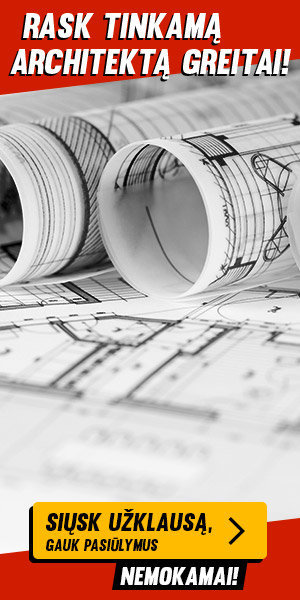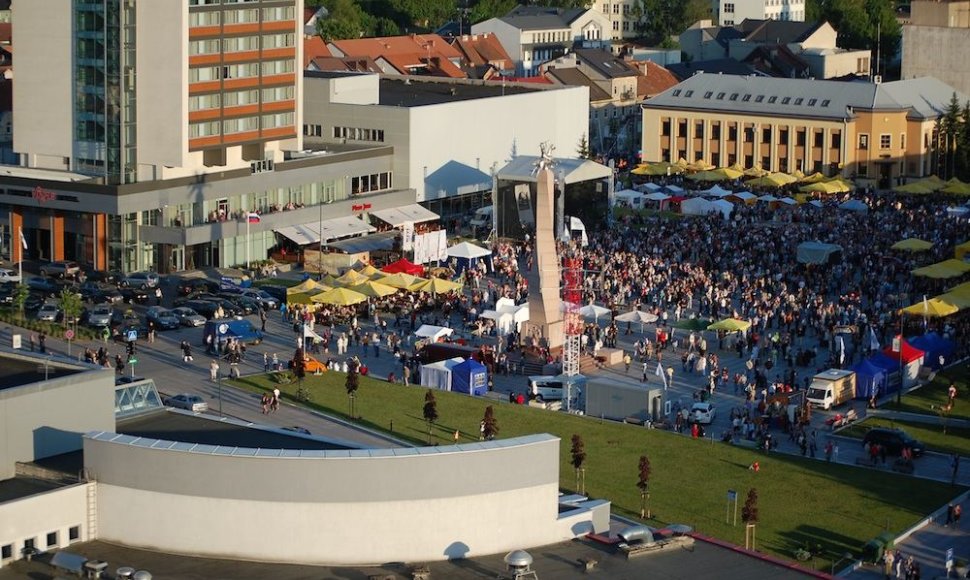World stars
Once a week, Marijampolė is transformed into the centre of Europe, with the opening of the biggest second-hand car market on the continent. At least according to Karl Schlögel, a German philosopher, sociologist, and traveller who published a book on Marijampolė several years ago. Back then, the market was indeed the point where the East met the West.
Vytautas Plečkaitis, signatory to the 11 March 1990 Independence Act, bought the book, Marjampole: Oder Europas Wiederkehr aus dem Geist der Städte, in Switzerland, where he was serving as ambassador. According to him, Schlögel was slightly suspicious of the fact that Europe's geographic centre lay just outside Vilnius.
The German author believes that the centre of Europe should be in Marijampolė, the town situated on the route connecting Warsaw and Berlin to Riga, Tallinn, and Scandinavia. Because of the used car market, ordinary people actually discovered Europe – they'd drive miles into the unknown, spend 14-16 hours to cross the border, learn German.
“Via trade, links to the Germans, Poles, Russians, and its excellent geopolitical situation, the town lives an active life of trade and commerce,” Plečkaitis once said in Marijampolė Forum. “Citizens of Marijampolė often visit Poland, Germany, Kaliningrad, where they buy and sell. These are the people who build bridges for the European civilization.”
It would be hard to call Marijampolė a provincial town. And not only because it looks incomparably more modern than Kapsukas – as the town was called under the Soviets. Should local residents wish to see sport stars play or artists perform, Kaunas is just 50 kilometres away – besides, the latter do come to Marijampolė, too. Ray Bartkus, an internationally-acclaimed graphic artist and illustrator, has opened his show here recently.
Opera star Violeta Urmanavičiūtė-Urmana, too, makes a stop in her native town on the way from her current home in Germany. Last September, she gave a performance together with her partner, Italian tenor Alfredo Nigro. After the concert, the authorities unveiled a bench dedicated to Urmana outside the Arts Centre.
Marijampolė boasts a lively cultural and entertainment scene – its modern Arts Centre holds events every week, popular Lithuanian and international singers and theatre companies come to perform, politicians and diplomats come from Vilnius to hold discussions.
True, tourists have yet to discover Marijampolė. Even if Polish, Spanish, and German travellers do come, most only cross the town on their way elsewhere. One factor that plays to Marijampolė's advantage is relatively bad service in Poland – eastbound travellers rush to cross the country and spend the night on the Lithuanian side. Finns like the town as a venue for conferences, Kazakhs still come for the car market.
Trains from Europe
Young Marijampolean Vaida has recently seen off her sweetheart to Vilnius. She also considered moving to the capital city, but decided she could not bear to leave her native town. Many other people interviewed by 15min confirm – both entrepreneurs and people they employ are comfortable living in Marijampolė.
Vidmantas Kučinskas, board chairman of one of the biggest business groups in the country, Arvi, likes it here, too. His house is in the nearby village of Kumelionys, while his office is in Marijampolė.
“In a big city, you'd have to drive an hour or two to reach an institution you need. And if I need to drive to Vilnius – I can admire the scenery on the way, the river Nemunas, valleys, forests, hills. A great way to relax, to recharge. You can't get into an argument after a trip like that.
“I had a meeting in Vilnius recently. I left 2 hours 20 minutes before the scheduled hour and still didn't make it in time. In Marijampolė, meanwhile, I am never late.”
Klemencas Agentas, chairman of another company, Mantinga, says he did not even consider to move to a big city. Being in Vilnius, the hub of resource distribution, might have been important under the Soviets, but not now.
A computer with a good internet connection allows one to work from any place on Earth. In other countries, many large companies are located in the provinces, closer to farmers or cheaper labour. In Lithuania, too, major dairy processing plants like Rokiškio Sūris and Pieno Žvaigždės are located outside the main urban centres.
One Arvi group company is situated in Kaliningrad – some 120 kilometres from Marijampolė. Vilnius is at least 140 kilometres away and Klaipėda, 236 kilometres. Marijampolė is located on the crossroads of two important highways. One of them, Via Baltica, will soon connect Helsinki to Central Europe, while the other one runs from Kaliningrad via Minsk all the way to Moscow. Lithuania's second city Kaunas is 60 kilometres away, the Polish border is even closer. Even now, Kaliningradians go to spas in Druskininkai via Marijampolė and so do Kaliningrad-bound Belarusians.
With the consent of the local community, the town will soon be traversed by the European-gauge railway Rail Baltica – something that will, Agentas believes, give a new lease on life to Marijampolė: “Everyone, starting in Kybartai near Kaliningrad and ending in Igliauka midway to Vilnius, will be going to the West from here. If Vilnius people want to go to Berlin, they will have to come either here or to Lazdijai to catch a train. Until they build the track to Kaunas, we will have a strategic advantage. And even afterwards, if people get into the habit of coming here instead of to Kaunas. We see a bright future for Marijampolė – it should be valued as a true border town.”
World-wide reach
Even though entrepreneurs appreciate living in a border town, the reach of their businesses is not limited to the regional or even national market. Frozen breads and cakes, sandwiches, pizzas, soups – all produced in the 20,000-square-meter Mantinga processing plant in Marijampolė – get exported to 30 countries. The plant employs about 650 local people.
Arvi group, headquartered in Marijampolė, manages an even more extensive international business network which includes turkey farm Arvi Kalakutai, sugar plant Arvi Cukrus, a hotel, fodder and fertilizer plants, animal by-product processing and utilization plants in Lithuania, Latvia, Romania, and Kaliningrad, also the Baltic Agrobusiness Institute. In all, the group, which started in a small textile factory, now includes over twenty companies.
“But they are concentrated here. Marijampolė is our native town,” says Justas Kučinskas, expansion coordinator of Arvi & co. “We do encounter certain obstacles, like a shortage of specialists, but these are not insurmountable. Being based in this town is becoming an advantage. We can create a work environment that would be impossible in Vilnius.”
Entrepreneurs recruit hard-working and talented staff from surrounding villages, some of them are even provided with a ride to work and lunch by their employers. There is a massage chair in Mantinga administration building – for those who work at their computers. After an employee emigrated to Sweden, not only did she not lose her job, but she was made the company's representative to Scandinavia.
“People are less motivated by money than by seeing a purpose in what they do, their personal contribution, realization that they work form something more than just profits. As the company grows, the town prospers, new businesses spring up,” Kučinskas believes.
Tired of being provincial
Kučinskas, who is arguably the biggest entrepreneur in town, is also a patron of many cultural events: “You cannot take away what's inside. Cultural things educate the man, transform his outlook. You cannot achieve that with money alone. We can build the best factories, but if there is no sense of responsibility, no spirit, they will not amount to much. We organize theatre performances, exhibitions. They can go to Vilnius for clubbing, if that's what they're after. And those who want to be free are welcome in Marijampolė.”
Tired of being called the province, Arvi people, in cooperation with the municipal authorities, set up a non-profit company Sveikatingumo Idėjos (Ideas of Healthy Living) to ease cooperation between the authorities and businesses in promoting education, culture, and sports. The company has a budget of one million litas (some 300 thousand euros) and applies for EU funding.
In addition to that, Mantinga supports institutions of education and social services, cultural and sports events, a regional basketball league club.
Oldest sugar plant in the country
For most Lithuanians, Marijampolė is inextricably associated with sugar. Sugar processing has old traditions here. It started back when the region was part of East Prussia. Men had to do military service and, after 5-6 years in the Kaiser's army, some would bring home sugar-beet seeds. According to another version, the variety could also have been brought to these parts by the Napoleonic army.
Interwar geographer Kazys Pakštas, having examined the soil, precipitation, and other factors, determined that lands surrounding Marijampolė, known as Suvalkija in Lithuanian, were most suitable to grow sugar-beed. In 1931, the company Lietuvos Cukrus (Lithuanian Sugar) built the first sugar plant in the country here.
The plant, which was the backbone of the town's industry, was the child of Lithuania's new business class that emerged after the country seceded from the Russian Empire. According to historian Norbertas Černiauskas, the wealthy Vailokaičiai brothers asked several farmers in Suvalkija to plant sugar-beet and then took the tuber crops to sell in East Prussia. Learning there that the Germans quite liked the Lithuanian product, they decided to make it their business.
When strikes and road blocking campaigns prevented the plant from being handed to Danish investors and was on the verge of bankruptcy, local farmers turned to the owner of Arvi with a plea to save the company. In 1999, Kučinskas' group acquired the plant and modernized it.
“The theory goes like this: a successful solution requires a SWOT (strengths, weaknesses, opportunities, and threats) analysis. In our case, it was the other way round: success followed decisions that were made intuitively. Success rewards not those who jump on the right train, but those who miss the train altogether and then arrive on their own train, offer something that wasn't there before,” Kučinskas explains how the sugar business was saved.
The plant employs some 350 people (or half the number off the season). In recent years, it produced almost 37 thousand tons of sugar. The production season usually lasts September to December, but last year, due to record-high yields (270 thousand tons of sugar-beet processed), the plant was kept busy until February. True, only 26,043 tons of white sugar can be sold within the EU, the rest must be exported further.
Only Lithuanian-grown tuber crops are processed in the Marijampolė plant. Most are grown by farmers in the surrounding districts. This year, the plant signed contracts with 193 farmers. Andrius Leškevičius, director of the sugar plant, is not above putting on a pair of rubber boots himself and splashing through the fields: “I find it interesting. Farmers and our raw stock require attention, we could not run a factory without that.”
Growth during downturn
Mantinga, which started operations right before the Russian crisis in the late 1990s, has just gone through another downturn. His is a company of crises, Agentas smiles. And a model for others to follow, too: instead firing people, the company opted for expansion and offered new products to the market.
“We spotted a niche – as people were to cut their spending on restaurants and cafés and instead lunch at their offices or homes, we offered food for those in a rush: pizzas, snacks, etc. And because of such innovations, we grew 3-5 percent during the downturn. Had we stuck to our old products, we would have definitely contracted,” Agentas says.
Kučinskas, who suddenly switches from discussing Marijampolė to national issues, adds: “Frankly speaking, things are moving chaotically. There was no strategy, therefore we've suffered many collapses and losses, entire farms, companies, and buildings were destroyed that could have been used productively. The government was incompetent to solve problems. Had we come to our grips earlier, we would be living better now. In Marijampolė, too, we saw large companies collapse – but we could have saved them.”
During the Soviet occupation, industry was the lifeblood of Marijampolė. The biggest and most progressive of all companies was the food processing machinery plant that had a workforce of over 2 thousand people, including some 400 engineers. It was later transformed into Fasa, the maker of food packaging machinery selling its produce in Europe, the Middle East and East Asia, North Africa, Central Asia, South America.
The plant that used to produce canned foods, gravies, jams, and lemonades is no longer there, while Pakma, an industrial food packaging machinery design and manufacturing company, survived the hard times. It exports most of its production to other European countries, Asia, and even Africa – as does another company, Marijampolės Pieno Konservai (Marijampolė Canned Milk).
Lithuanian town
Marijampolė, often referred to as the capital of Suvalkija, is the seventh-biggest town in Lithuania. It grew out of the village of Pašešupis – meaning a place by the river Šešupė – which was first mentioned in written sources in 1667. In the early 18th century, Count Mark Anthony Butler, starost of Prienai, moved here and renamed the town Starapole. Another settlement started growing in the vicinity, where the starost's wife, Franciszka Butler, financed a church and a monastery of the Marian Fathers. The town was named Marijampolė after them.
In 1864, after an unsuccessful uprising, the Russian Tsar's administration banned press in Latin characters. Marijampolė, which was under the Prussian jurisdiction, became the centre of Lithuanian national movement. One of the beacons of the national enlightenment was the local gymnasium that had among its pupils Jonas Basanavičius and Vincas Kudirka – the fathers of the Lithuanian national revival.
In the beginning of the century, Lithuanian-speakers made up 18 percent of the town's population which was 50-percent Jewish. Between the wars, the share of Lithuanians grew to almost two thirds. In 1941 most of Marijampolė Jews were exterminated by the Nazis and their collaborators.
Marijampolė County is the birthplace of many people who played key roles in the 19-century national revival. A number of the signatories of the 1918 Independence Act came from here, including Jonas Basanavičius, the chairman of the Council of Lithuania that drafted the document. Jonas Jablonskis, linguist and the father of the modern Lithuanian language, also came from Suvalkija, so the local dialect was used as the basis for standardized Lithuanian.






















